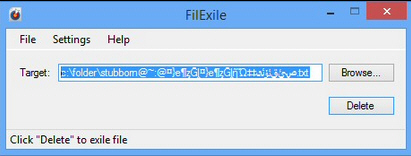FilExile deletes files or folders that Explorer won’t touch
 Deleting files from Windows Explorer is usually very easy. Select your target, tap "Del", click the "Yes, I really mean it" button and the object disappears forever. (Or is sent to the Recycle Bin, anyway.)
Deleting files from Windows Explorer is usually very easy. Select your target, tap "Del", click the "Yes, I really mean it" button and the object disappears forever. (Or is sent to the Recycle Bin, anyway.)
Sometimes you’ll get an "in use" error, though, usually because the file is locked by Windows or the system. It’s best to find out why -- the file could be important -- but if all else fails, a specialist tool like Unlocker can help you to delete it anyway.
You might alternatively be warned that there’s a problem with the file name: it’s too long, "invalid", or something similar. This kind of issue will defeat even Unlocker-type programs, but fortunately FilExile is here to help.
The program downloads and installs quickly, and presents the user with a very basic interface. There’s a "Browse" button to select the offending file/ folder, or a "Target" box where you can specify it manually. Either way, click "Delete" when you’re done and the file should disappear forever.
This worked well in our first tests, correctly removing files with invalid names. It can’t delete locked files, however, so you’ll still need a copy of Unlocker.
Explore the menus and you’ll find one or two extras, particularly in the Options dialog. For instance, it can add an extension to Explorer, allowing you to delete files or folders from the right-click menu (Settings > Options > Advanced). There’s also a multi-threading option to speed up the deletion process.
The program even supports a command line interface for automated wiping, and this can additionally delete all the folders and files specified in a "job" file.
While more flexibility is always a good thing, we’re not quite sure how valuable these features will really be. If you regularly need this kind of batch delete option then you should probably investigate why your system is producing all these invalid files in the first place.
FilExile is an easy-to-use tool which can help you get rid of stubborn files and folders, though, and you should probably keep a copy around for emergency use.